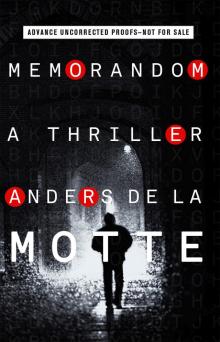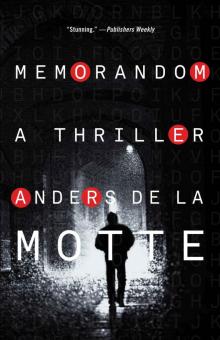- Home
- Anders de la Motte
Ultimatum Page 12
Ultimatum Read online
Page 12
An hour ago the screws had done their evening round. Locked him and Gilsén in their cells before closing the section for the night. Giving him a chance to be alone with his thoughts.
Abu Hamsa had been shot in the street. A single shot in the center of his head. That sort of operation was risky; it required a professional. Someone who was flown in and out of the country, and demanded serious money for their services. That sort of job also attracted unwanted attention, from both the public and the police. Why not make things easier for themselves? Get Abu Hamsa inside one of his restaurants after it closed, at the races, or, even better, when he shuffled out in his slippers to fetch the morning paper. Any small-town nobody could do a thing like that for a tenth of the price without attracting apocalyptic headlines. Someone wanted to show their power, their strength. But who, and what for?
Rosco was right: Abu Hamsa was dead, and their agreement had died with him. At midnight Gilsén would be getting a visit from Rosco and his guys, and whatever secrets the little man still harbored would be revealed. All Atif had to do was look the other way, pretend nothing was happening. Go on sitting out his time obediently. Time he didn’t actually have.
He changed position, put his hand in his pocket, pulled out the folded playing card, and slowly opened it out. Three hard folds dividing the colorful joker into eight identically sized sections.
The clock behind the thick plexiglass screen above the cell door clicked. Two hours left until midnight, precisely . . . now. A short signal echoed through the facility, and then the lights went out. Atif lay still for a couple of seconds, listening to the dense silence. The windows lay deep within the thick walls, making it almost impossible to see the stars. They were up there, waiting for him, just like Tindra. As long as he kept a cool head and thought long-term. Played his cards in exactly the right order. He slowly folded the joker again and put it back in his pocket. Then he got to his feet and crept silently over to the door of his cell.
Ten
Senior prison officer Benny Blom knew the man in the cell was dead before he even opened the door. Yet he still found himself holding his breath. He’d been through all this before: the kneeling, forward-leaning posture, the swollen face and bulging, vacant eyes. The stench rising from the pool of piss on the floor around the man’s bare knees mixed with a more cloying stench from his underpants. Even the improvised noose—a pair of Prison Service sweatpants tied to the bars on the window, and now the only thing holding the body up—was familiar. All in all a neat job, just as agreed, and nothing to trouble his conscience. Not for very long, anyway. The man in the noose had chosen to play the game of his own volition, and there were plenty of victims and relatives who would think he’d gotten just what he deserved. And after a couple of weeks in Thailand any lingering pangs of guilt would be blown away, Blom knew that from experience. Because he was one of the good guys, in spite of everything. Someone who helped to uphold justice.
Even so, he did his best to act suitably surprised in front of his colleagues. Took a couple of cautious steps into the cell and extended one hand toward the dead man. Just as he expected, the skin was waxy and ice-cold. Any attempt at CPR would be pointless. Not to mention disgusting, considering the black, half-bitten-off tongue sticking out of the man’s lips.
He turned around to the guard who had fetched him from the staff gym and was now standing in the doorway with an equally wide-eyed colleague.
“Stone dead.” Blom pulled his hand back. “And he’s been dead awhile, so there’s no rush. Get Control to call the police and say another one’s decided to check out.”
Blom gestured to the two men to leave, then backed away slowly in the same direction. When he was sure no one was watching, he pulled out his phone and took a couple of quick pictures of the body. Just as well to have proof that he had kept his side of the deal.
Suddenly he heard someone calling for his colleagues out in the corridor. A low, muted voice that he couldn’t quite place.
It took a couple of seconds for Blom to realize that the voice was coming from the cell next door.
“Tell the cops I know what happened. That I want to talk.”
• • •
Julia Gabrielsson had folded her arms on her desk, leaned her head on them, and closed her eyes. She’d dozed off for a while until her phone woke her. For a few moments her brain fumbled for a time and place. After some hesitation, it came to the conclusion that it was Tuesday morning and that she was in her office at work.
She hadn’t gotten much sleep in the past twenty-four hours. The big deployment following Abu Hamsa’s murder lasted until well into Monday evening, and Pärson had kept her until midnight before letting her go home to get a couple of hours’ sleep. She wasn’t counting on getting any overtime for that marathon shift.
Her phone was still ringing and she picked up the receiver. Pärson, naturally.
“My office, three minutes.”
She got to her feet, picked up her mug of coffee, and set off toward the women’s restroom. Pärson was seriously pissed off with her—that much was obvious; he wouldn’t have demoted her to desk duties otherwise. He’d got her searching databases, something any civilian employee could have done, and the result was a long list of people who were in some way connected to Abu Hamsa. Sixty-two of them so far. At the top of the list were the old man’s daughter, Susanna, and her husband, Eldar Jafarov, who also happened to be Abu Hamsa’s bodyguard. Presumably they’d be taking over the business from Abu Hamsa. Unless the people behind his murder had other plans. They were likely to find out which fairly soon.
She splashed some water on her face and tipped the cold coffee into the basin. Time for a more thorough chewing out for her and Amante’s little adventure. She wondered who had talked. Probably that gym-pumped prison officer. But did Pärson also know about their trip to the nursing home?
Of course, she could give an account of what they’d discovered. Explain that Sarac had absconded and show the picture of the mysterious Frank who had helped him. But she was still hesitant about involving Pärson. She’d much rather wait and see how much he knew before revealing what they had found out.
Julia refilled her mug, took a deep breath, then knocked on Pärson’s door. The “engaged” light was already glowing angrily.
“Come in.”
The bags under Pärson’s eyes seemed to have bred, and the smell from his nylon shirt was even more acrid than usual. On one of the chairs in front of his desk sat a tall, thin man in an impeccable uniform. Freshly ironed white shirt, heavy gold cuff links that matched the epaulettes on his shoulders. Staffan Kollander, head of Regional Crime, in person.
“Sit.” Pärson waved toward the free chair.
Julia smiled tentatively at Kollander and received a reserved nod in response.
“There’s been a development. Related to the Abu Hamsa case.”
Pärson’s tone of voice made it clear that she wasn’t yet back in favor, but she still felt relieved. This wasn’t about her and Amante’s freelance jaunt. She wouldn’t have to reveal any of their discoveries yet.
“Early this morning a man was found dead in his cell in a phoenix unit south of Stockholm,” Kollander said. “For the time being, the evidence suggests suicide. But the victim is linked to Abu Hamsa. And . . .” He paused, and fixed his gaze on Julia for several seconds. “. . . there’s a witness. The occupant of a neighboring cell says he has information. He claims it could lead to a breakthrough in the investigation into Abu Hamsa’s murder.”
“That . . .” Julia cleared her throat. “That sounds promising.”
“But we have a slight problem,” Pärson muttered. “This so-called witness is demanding to talk to Amante in person, just the two of them. Otherwise he won’t say a word. And the interview also has to take place here in Police Headquarters and not out at the prison. Ridiculous idea.” Pärson glared at Julia as if all this was her
fault.
“Naturally, under normal circumstances we never agree to ultimatums. But Superintendent Pärson and I agree that the current situation is a little”—Kollander formed his thin fingers into an arch and slowly drummed his fingertips against each other—“out of the ordinary.”
“Precisely,” Pärson said. “The van is already on its way here from the prison. We’re preparing an interview room. Amante hasn’t turned up this morning and he’s not answering his phone. You’ve got an hour and a half to find him and brief him on the case. Gilsén’s body is on its way to the Forensic Medicine Unit; we should get a preliminary report from them before lunch.” He scratched his ear with a stubby little finger, then inspected the result.
“I don’t quite understand,” Julia said. “Why does the witness want to talk to Amante?”
Pärson and Kollander exchanged a glance.
“Apparently he and the witness are already acquainted,” Pärson said smoothly. “But that’s something you and I can talk about in more depth on another occasion, Gabrielsson.”
Julia carefully closed Pärson’s door behind her and took her cell phone out, but waited to make the call until she was back in her own office. An inmate of a phoenix unit who wanted to talk to Amante directly. That could only be one person. But why did he want to talk to Amante and not her? What did he have to say? There was only one way to find out.
• • •
“You’ve reached the Care Center. This is Natalie Aden. How can I help?” Natalie opened the page containing the doctors’ schedules on the computer as she listened to what was troubling the old dear on the other end of the line. “We’ve got a vacancy tomorrow, Wednesday at twelve o’clock, would that be convenient?”
The physiotherapist with the dimples sauntered slowly up to the counter. For the fifth time today, if Natalie’s counting was accurate. That was at least three too many. Even so, she had nothing against his presence.
“Great, so we’ll see you tomorrow at twelve o’clock.”
She ended the call by gently pressing the side of her cordless headset.
“Just wondered if you’d like a coffee,” the physiotherapist said.
“Definitely.” She surprised herself with how happy she sounded. The physiotherapist was the same age as she was, a little under thirty. Maybe not massively handsome—his eyes were slightly too close together and he had a bit of a belly—but there was something about him that appealed to her. Something that made her feel happy every time he invented yet another obviously fake reason to visit reception.
“Okay. A splash of milk, no sugar?” he said.
“No, I’m sweet enough.” She bit her lip but was too late to stop the cretinous comment slipping out.
The physiotherapist flashed his dimples. “I can’t disagree with that.”
He turned and walked off toward the staff room.
Shit. She had to play it cool. Stick to the role of extremely competent and practically indispensable receptionist she’d been playing for the past few months, instead of a women’s magazine cliché.
She’d applied for the job on the off chance. She tweaked her CV and a few other documents to make herself look qualified enough; then, once she’d got the job, surprised herself by actually enjoying it. Answering the phone, making appointments. Giving little bits of advice to the regulars whose ailments she’d already learned. Okay, it wasn’t the doctor’s job she’d once dreamed of, but it was pretty close. Here she was, putting in the hours on a regular job. Who’d have thought it?
Considering what she’d been through just a few months before, it all felt rather surreal, but in a good way. She pulled her ChapStick from her pocket and ran it quickly over her lips while she waited for the physiotherapist to return.
The main door opened and a thin, swarthy man came in. His club blazer looked as if he’d slept in it, and the worn tennis shirt under it had obviously seen better days. Taken together with the slightly distant look in the eyes behind his glasses, his clothes told her what he wanted long before he opened his mouth: Time to get a new prescription for lithium and tranquilizers. Natalie clicked to bring up the doctors’ schedule again and highlighted the psychiatrist’s. Damn, she was good at her job.
“Hello, welcome to the Care Center. How can I help?” She smiled her best receptionist’s smile. Waited for the man to confirm what she already knew.
“Natalie Aden?” the man said, and something in the way he said her name brought her up short.
“Why?” she said before she had time to think.
An ID badge appeared in front of her. Police. Natalie stiffened. Had her boss found her out? Called the cops without saying anything? Hang on, though. Would they really send a detective to deal with something as basic as a fake résumé?
“My name is Omar Amante. I work with the Stockholm Police. We’re trying to find someone in connection to a murder investigation. A David Sarac. You were out on Skarpö when he was wounded, weren’t you?”
The relief that had begun to spread through Natalie’s body stopped abruptly.
Now keep quiet about the real reason you were on that island, Natalie. Don’t say anything you don’t have to . . . Don’t ask questions.
“I’ve already told you everything I know.” She met the policeman’s gaze. She was surprised at how depressed he looked.
She heard voices from the corridor: the physiotherapist and her boss, both heading in her direction.
“Look, no one here knows I was out there. I’ve tried to put it all behind me.”
“But you were David Sarac’s personal assistant, weren’t you? His caregiver?”
“Only for a few weeks. We barely had time to get to know each other. I haven’t spoken to him since then. Is he okay?” she added. And regretted the question the moment it slipped out.
The detective didn’t answer. Even so, there was something in his face that told her Sarac was far from okay.
He put a grainy photograph down on the counter in front of her and smoothed out the edges to stop it rolling up.
“Do you recognize this man?” Those sad eyes lingered on her; they seemed to pick up the slightest change in her expression. The voices in the corridor were getting closer.
An unknown face, half turned away. Time for her relief to get a bit of a boost. But anxiety still had an icy grip on her insides, turning into the cold of last winter.
She could see it before her. Sarac leaning back against a tree. The gun in his hand, the blood spreading on the snow. The smell of smoke, powder, and something else. Mortal dread.
The physiotherapist and her boss came around the corner. They’d be at her desk any moment now. And would notice something was wrong, start asking questions.
“I’ve never seen this person before,” she whispered to the detective. She was used to acting at being believable and making a lie sound genuine. Considerably less used to doing the same with the truth. She had to say something, do something—anything—to make him believe her. To make him leave. At once, before everything was ruined.
“Are you quite sure? He says his name is Frank. He and Sarac knew each other. It’s very important that we find him.”
Natalie shook her head hard. She quickly rolled up the photograph.
“So that’s your appointment, booked for Monday. Thanks for calling in,” she said, slightly too loudly. She quickly held out the photograph, tilted her head, and mimed the words Please, go.
The detective looked as if he was about to say something, then suddenly there was a muffled buzzing sound from the inside pocket of his crumpled jacket. He made no effort to answer it, just went on looking at her with that sad expression until the physiotherapist put a mug of coffee down on the counter right next to him. A splash of milk, no sugar. Because she was sweet enough.
“Thanks very much for your help, Natalie,” the detective said, taking the photograph. He
discreetly exchanged it for a business card with a handwritten phone number on the back.
It wasn’t until later on that she realized that the detective had talked about David Sarac in the past tense. As though he no longer existed.
Eleven
The interview room was no more than ten square meters in size. A claustrophobic, windowless cube. Julia looked at the screens in front of her. There were a number of different cameras in the room, showing the man inside from a variety of angles.
She saw Amante step into the cube and put the folder she had given him forty-five minutes ago on the table. He pulled out his chair and moved it away from the table before sitting down, partly out of view.
“Adjust the angle slightly,” Kollander said to the technician who was sitting at the keyboard. The man turned a knob and Amante reappeared in the center of the middle screen.
“You wanted to talk to me, Kassab,” Amante said inside the room, making a little sound meter close to Julia start to move.
“I didn’t think you were going to show up, Vaseline.”
Amante shrugged his shoulders. “Well, I’m here now.”
Kassab looked up toward one of the cameras. Then another one. “Are there many of them?”
“Who?”
“People watching. I can imagine there’s a fair number of them.”
“I honestly don’t know.”
The right answer would have been five, Julia thought. Herself, Kollander, the technician, Pärson, and another officer with a pockmarked face whose name she couldn’t quite remember. Probably one of Kollander’s errand boys.
Kassab looked hard at Amante. “You look more tired than when we met the other day. Looks like you’ve been sleeping in those clothes. Your partner, that blonde woman, was she the one who told you to come? You answer when she calls, don’t you? I would too.”

 Rites of Spring
Rites of Spring Game: A Thriller
Game: A Thriller End of Summer
End of Summer Buzz: A Thriller
Buzz: A Thriller The Game Trilogy
The Game Trilogy Bubble: A Thriller
Bubble: A Thriller MemoRandom
MemoRandom Ultimatum
Ultimatum MemoRandom: A Thriller
MemoRandom: A Thriller